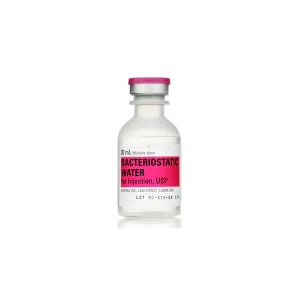
Review of Bacteriostatic Water
Introduction: Bacteriostatic water is a sterile, non-pyrogenic preparation of water for injection, containing 0.9% (9 mg/mL) of benzyl alcohol added as a bacteriostatic preservative. This product is commonly used as a diluent for medications that require reconstitution or dilution prior to injection. It is widely utilized in both clinical and research settings due to its stability and ability to inhibit bacterial growth, extending the shelf life of the reconstituted medications.
Product Overview:
- Composition: Sterile water with 0.9% benzyl alcohol.
- Packaging: Typically available in multi-dose vials.
- Usage: Primarily for diluting or dissolving medications for injection.
Key Features and Benefits:
- Sterility and Safety: Bacteriostatic water is produced under stringent conditions to ensure it remains free from contaminants and pyrogens. The addition of benzyl alcohol not only prevents bacterial growth but also allows the product to remain sterile for multiple uses within a certain period, usually 28 days after initial use.
- Versatility: This product is highly versatile, making it suitable for a wide range of applications. It is commonly used to reconstitute lyophilized (freeze-dried) drugs, including peptides, hormones, and other injectable medications. Its compatibility with various medications ensures that it can be used across multiple medical and research fields.
- Extended Shelf Life: The bacteriostatic agent (benzyl alcohol) extends the usability of the product after the first withdrawal. This is particularly advantageous for multi-dose vials, reducing waste and improving cost-efficiency in clinical and research settings.
- Ease of Use: Bacteriostatic water is user-friendly, with clear labeling and instructions for use. Its availability in different vial sizes also provides convenience, allowing users to select the appropriate volume based on their specific needs.
Review of Bacteriostatic Water in Research
For research companies like bacteriostatic water is essential for preparing research peptides and other compounds. Its role in ensuring the stability and sterility of reconstituted peptides is crucial for accurate and reproducible results. Researchers appreciate the product’s ability to maintain the integrity of their solutions over extended periods, facilitating longer-term studies without the need for frequent reconstitution.
Is it Safe to Inject Bacteriostatic Water?
Injecting bacteriostatic water on its own is not safe or recommended. Bacteriostatic water is specifically designed to be used as a diluent for reconstituting medications that are intended for injection. It contains 0.9% benzyl alcohol, which acts as a preservative to prevent bacterial growth, allowing multi-dose vials to be used safely over a period of time. Here are some important considerations regarding the safety of bacteriostatic water:
Safe Usage:
- Diluent Purpose:
- Bacteriostatic water is intended to be mixed with medications that require reconstitution or dilution before being injected into the body. It is not meant to be injected on its own.
- Proper Reconstitution:
- Ensure that the medication you are reconstituting is compatible with bacteriostatic water. Follow the specific instructions provided by the medication manufacturer or a healthcare professional.
- Sterility and Handling:
- Use aseptic techniques when handling and mixing to maintain sterility and prevent contamination. This includes using sterile needles and syringes and ensuring that the vial stoppers and surfaces are clean.
Potential Risks of Improper Use:
- Injection Site Reactions:
- Injecting bacteriostatic water alone can cause pain, irritation, and other local reactions at the injection site.
- Toxicity:
- Benzyl alcohol, the preservative in bacteriostatic water, can be toxic if injected in large amounts. It is particularly dangerous for neonates and premature infants, as it can lead to a condition known as “gasping syndrome,” which is potentially fatal.
- Lack of Therapeutic Effect:
- Injecting bacteriostatic water alone has no therapeutic benefits and does not provide any medical treatment. It is only useful when used as intended to prepare medications for injection.
Safe Practices:
- Consult Healthcare Providers:
- Always consult with a healthcare provider before using bacteriostatic water to ensure it is appropriate for your specific medication and situation.
- Follow Instructions:
- Adhere strictly to the instructions provided for reconstituting medications. Use the correct volume of bacteriostatic water as specified.
- Monitor for Reactions:
- Observe for any adverse reactions after injection of the reconstituted medication and seek medical attention if necessary.
Buy Bacteriostatic Water Conclusion
Bacteriostatic water is a reliable and indispensable product in both clinical and research environments. Its combination of sterility, versatility, and extended shelf life makes it an excellent choice for diluting and reconstituting a wide variety of injectable medications. For those in the field of research, particularly in peptide science, it provides a dependable solution that supports the rigorous demands of experimental protocols. Overall, bacteriostatic water is a highly recommended product for anyone requiring a safe, effective, and convenient diluent for injectable drugs.
What are the Side Effects of Bacteriostatic Water?
Bacteriostatic water is generally well-tolerated and safe for most uses, especially when used as intended for diluting or dissolving medications for injection. However, like any medical product, it can have potential side effects and risks. Here are some of the possible side effects and considerations:
Common Side Effects:
- Injection Site Reactions:
- Pain
- Redness
- Swelling
- Itching
Less Common but More Serious Side Effects:
- Allergic Reactions:
- Rash
- Itching
- Swelling (especially of the face, tongue, or throat)
- Severe dizziness
- Trouble breathing
- Toxicity of Benzyl Alcohol:
- In Infants: Benzyl alcohol has been associated with a potentially fatal “gasping syndrome” in premature infants and neonates. Symptoms include metabolic acidosis, respiratory distress, central nervous system dysfunction, and sometimes death.
- In Other Populations: While rare, benzyl alcohol can cause hypersensitivity reactions or toxicity in other sensitive individuals.
Usage Considerations:
- Contamination Risks:
- Improper handling or storage can lead to contamination, which may result in infections.
- Compatibility:
- Not all medications are compatible with benzyl alcohol, so it’s important to verify that the specific medication can be safely mixed with bacteriostatic water.
- Avoid in Specific Populations:
- Due to the risks associated with benzyl alcohol, bacteriostatic water should be avoided in neonates, especially premature infants.
- Caution should be exercised when used in pregnant or breastfeeding women.
Precautions:
- Dosage and Administration:
- Always follow the specific dosage and administration instructions provided by healthcare professionals to minimize the risk of side effects.
- Monitoring:
- Patients should be monitored for any adverse reactions, especially during the first use or when used in higher-risk populations.
- Storage:
- Store bacteriostatic water properly according to the manufacturer’s instructions to prevent contamination and maintain sterility.
Review of Bacteriostatic Water
While bacteriostatic water is widely used and generally safe, it is essential to be aware of the potential side effects and precautions. Most adverse effects are related to injection site reactions or allergic responses to benzyl alcohol.
What are the Benefits of Bacteriostatic Water?
Benefits of Bacteriostatic Water
1. Sterility and Safety
Bacteriostatic water is produced under stringent sterile conditions, ensuring it is free from contaminants and pyrogens. The addition of benzyl alcohol acts as a preservative, inhibiting the growth of bacteria and maintaining sterility after multiple uses within a specified period (usually 28 days).
2. Extended Shelf Life
The presence of 0.9% benzyl alcohol extends the usability of bacteriostatic water beyond a single use. This is particularly beneficial for multi-dose vials, reducing waste and enhancing cost-efficiency in both clinical and research settings.
3. Versatility
Bacteriostatic water is highly versatile and can be used to reconstitute or dilute a wide range of medications, including peptides, hormones, and other injectable drugs. Its compatibility with various substances makes it valuable across different medical and research fields.
4. Reduced Risk of Contamination
The bacteriostatic agent (benzyl alcohol) helps prevent bacterial growth, significantly reducing the risk of contamination when reusing vials. This feature is critical for maintaining the integrity of the solution over time.
5. Convenience
Available in multiple vial sizes, bacteriostatic water offers convenience for different needs. It is user-friendly with clear labeling and instructions, making it easy to handle and administer.
6. Cost-Effective
By allowing multiple withdrawals from the same vial without contamination, bacteriostatic water helps reduce the need for frequent replacements, thus offering a cost-effective solution for healthcare providers and researchers.
7. Ideal for Research Use
For research institutions, bacteriostatic water is essential for preparing research peptides and other compounds. Its ability to maintain sterility and stability of solutions is crucial for ensuring accurate and reproducible results in experiments.
Review of Bacteriostatic Water – Summary
Bacteriostatic water is a sterile, non-pyrogenic solution containing 0.9% benzyl alcohol, used primarily as a diluent for reconstituting injectable medications. It is designed to inhibit bacterial growth, allowing for multiple uses from the same vial over a period of up to 28 days. Key benefits of bacteriostatic water include:
- Sterility and Safety: Manufactured under stringent conditions to ensure it remains free from contaminants and pyrogens, making it safe for medical use.
- Extended Shelf Life: Benzyl alcohol acts as a preservative, extending the usability of reconstituted medications and reducing waste.
- Versatility: Suitable for diluting a wide range of medications, including peptides and hormones, making it valuable in various medical and research applications.
- Reduced Contamination Risk: The bacteriostatic agent helps maintain the sterility of the solution, minimizing the risk of bacterial contamination with multiple withdrawals.
- Convenience: Available in multiple vial sizes with clear labeling and instructions, it is user-friendly and easy to handle.
- Cost-Effectiveness: By allowing for multiple uses from a single vial, it reduces the need for frequent replacements, offering a cost-effective solution.
- Ideal for Research: Essential for preparing research peptides and other compounds, it ensures the stability and accuracy of experimental results.
Overall, bacteriostatic water is a reliable and indispensable product in clinical and research settings, providing a safe, effective, and convenient means of preparing injectable medications.
